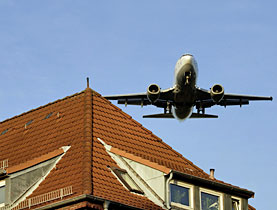
Limitations found in airport noise compromise

A new row has erupted over an ongoing aircraft noise-pollution issue just as Zurich airport prepares for the busy festive season.
Politicians, business leaders and people living around the airport have demanded action after a compromise solution to alleviate disturbance comes under strain just one year after being introduced.
Local residents have long complained that the steadily increasing number of flights has disturbed their sleep, health and property prices.
Their complaints intensified five years ago when Germany banned weekend and night flights to Zurich over the southern part of its territory. This resulted in yet more noise disturbance for a larger part of the city and its suburbs.
Voters rejected an outright cap on the number of aircraft movements during a referendum in November last year. But they accepted a compromise plan from the city authorities – a noise pollution index – that sought to limit the number of people affected by noise pollution.
However, a surge in the number of people living in the area and more night flights have created an 8.3 per cent increase in indexed noise pollution despite air traffic rising by less than three per cent in the past 12 months.
Decision on hold
If the numbers continue to stack up at the same rate then the authorities would soon be forced to curb flight movements – a situation that could cost the local economy, business leaders have warned.
Left-wing political parties of the cantonal parliament and residents’ pressure groups have demanded immediate action to curb the amount of noise. The business community called the index system unworkable, while the rightwing People’s Party demanded a solution to the current impasse with Germany.
The canton’s economics minister, Rita Fuhrer, responded by ordering a thorough analysis of the situation that would take a year to complete.
Swiss aviation expert Sepp Moser told swissinfo that the latest twist in the noise-pollution debate was farcical.
“The index was merely designed to keep people quiet and was not in any way rational. This has very little to do with facts, it is about emotions and political meddling,” he said.
“The authorities hope that during the next year the number of movements will decrease, and that is a realistic expectation because of the recent economic developments. It is not a solution to the problem but it just pushes it further into the future.”
Flight plan rejected
Zurich airport operators Unique said it does not expect an increase in the number of compensation claims by residents disturbed by aircraft noise. But spokeswoman Sonia Zöchling said the figures had surprised everyone.
“It could not have been what the canton had in mind when it suggested the index a year ago, or what people had in mind when they voted for it,” she told swissinfo.
The situation was not helped in the summer when the federal aviation authorities rejected, on the grounds of safety, a proposal to create a new northern approach pattern that would have taken aircraft away from more densely populated areas.
Switzerland and Germany, however, did agree earlier this year to look afresh at the dispute over flight paths.
swissinfo, Matthew Allen in Zurich
The Zurich airport noise-pollution index was voted into existence in November 2007. It measures the amount of disturbance caused to residents living near to the airport, taking into account the greater nuisance of night flights.
The number of people shown by the index to be suffering from aircraft noise this year was 46,300 – an increase of 8.3% on 2007.
The cantonal authorities are obliged to act on behalf of the affected residents when the figure reaches 47,000.
When the index was created, it was expected this would happen when flight movements reached around 320,000 – but take-offs and landings at Zurich airport numbered 254,732 between January and November of this year (an increase of 2.9%).
A federal report predicts flight movements at the airport will rise to 450,000 by 2030 to meet growing demand. Another report from the business community warned that restricting movements to 250,000 would cost the economy up to SFr7.5 billion ($6.84 billion).
Until the end of November, 20,489,047 passengers passed through Zurich airport – a rise of 7.1% on the corresponding period last year. The airport expects that figure to climb to 22 million by the end of the year.
The number of takeoffs and landings increased by 2.9% to 254,732. There were a total of 268,786 movements for the whole of 2007.
The company that runs Zurich airport – Unique – reported a 73.1% increase in profits (to SFr79.8 million) for the first half of 2008 compared to the same period last year.
Unique has received some 19,000 noise-pollution compensation claims, expected to cost the airport operator (and ultimately users of the airport) around SFr760 million.

In compliance with the JTI standards
More: SWI swissinfo.ch certified by the Journalism Trust Initiative


























You can find an overview of ongoing debates with our journalists here . Please join us!
If you want to start a conversation about a topic raised in this article or want to report factual errors, email us at english@swissinfo.ch.